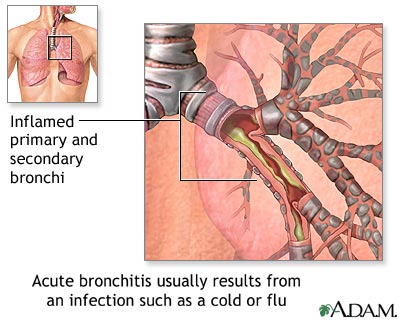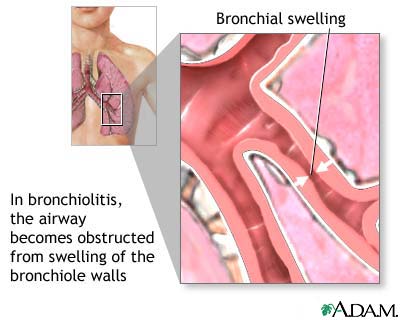
WHAT IS BRONCHITIS?
Bronchitis is a respiratory disease in which the mucus membrane in the lungs’ bronchial passages becomes inflamed.


As the irritated membrane swells and grows thicker, it narrows or shuts off the tiny airways in the lungs, resulting in coughing spells that may be accompanied by phlegm and breathlessness.
UNDERSTANDING BRONCHITIS
The disease comes in two forms: acute (lasting from one to three weeks) and chronic (lasting at least 3 months of the year for two years in a row). People with asthma may also have asthmatic bronchitis, inflammation of the lining of the bronchial tubes.
Acute bronchitis may be responsible for the hacking cough and phlegm production that sometime accompany an upper respiratory infection. In most cases, the infection is viral in origin, but sometimes it’s caused by bacteria.
If you are otherwise in good health, the mucus membrane should return to normal after you’ve recovered from the initial lung infection, which usually lasts for several days.
Chronic bronchitis is a serious long-term disorder that often requires regular medical treatment. If you are a smoker and come down with acute bronchitis, it will be much harder for you to recover. Every cigarette damages the tiny hair-like structures in your lungs, called cilia, that are responsible for brushing out debris, irritants, and excess mucus. If you continue smoking, the damage to these cilia prevent them from functioning properly, thus increasing your chances of developing chronic bronchitis. In some heavy smokers, the mucus membrane lining the airways stays inflamed and the cilia eventually stop functioning altogether. Clogged with mucus, the lungs are then vulnerable to viral and bacterial infections, which over time distort and permanently damage the lungs’ airways. This permanent condition is called COPD (chronic obstructive pulmonary disease). Your doctor can perform a breathing test, called spirometry, to see if you have developed COPD. WebMD has many resources to help you to successfully quit smoking.
Chronic bronchitis is one of two main types of a COPD. The other main form of COPD is emphysema. Both forms of COPD make it difficult to breathe.
Acute bronchitis is very common. The disorder often can be treated effectively without professional medical assistance. However, if you have severe or persistent symptoms, high fever, or if you cough up blood, you should see your doctor. Seek emergency medical help if you have trouble breathing or have chest pain. If you suffer from chronic bronchitis, you are at risk for developing heart problems, as well as more serious lung diseases and infections, so you should be monitored by a doctor.
WHAT CAUSES BRONCHITIS?
Acute bronchitis is generally caused by lung infections, 90% of which are viral in origin. Repeated attacks of acute bronchitis, which weaken and irritate bronchial airways over time, can result in chronic bronchitis.
Industrial pollution is another culprit. Chronic bronchitis is found in higher-than-normal rates among coal miners, grain handlers, metal molders, and other people who are continually exposed to dust and fumes. But the chief cause is heavy, long-term cigarette smoking, which irritates the bronchial tubes and causes them to produce excess mucus. The symptoms of chronic bronchitis are also worsened by high concentrations of sulfur dioxide and other pollutants in the atmosphere.
content provided via www.WebMD.com
